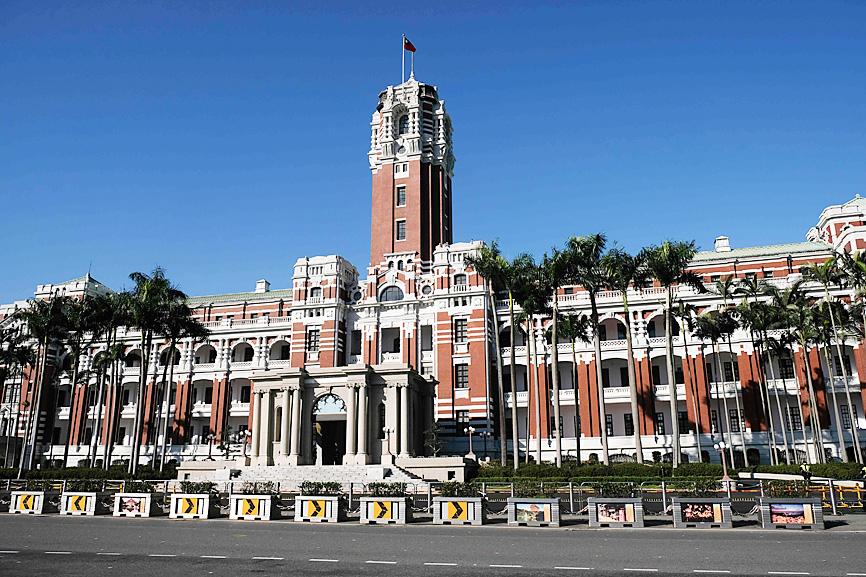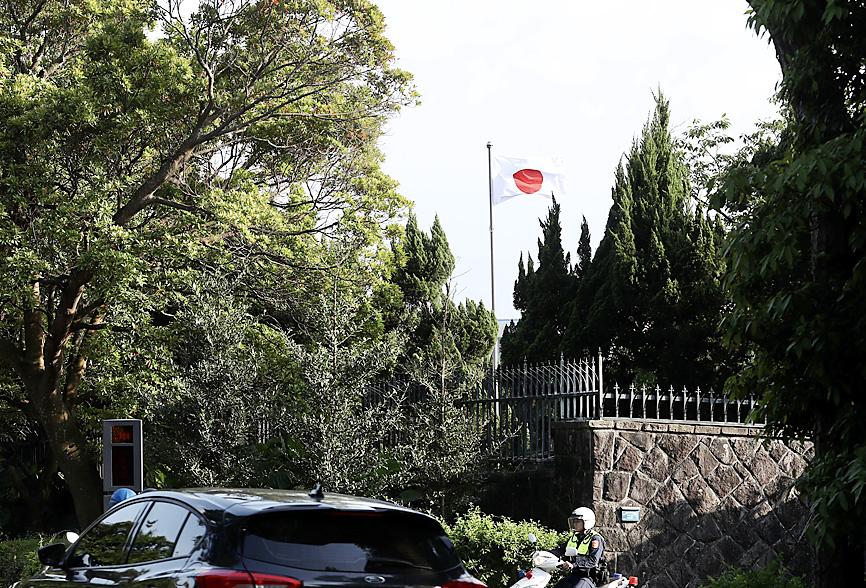The Presidential Office yesterday welcomed a joint statement by the US and Japan that underscores their commitment to peace and stability in the Taiwan Strait.
The statement, issued by the White House after a meeting between US President Joe Biden and Japanese Prime Minister Yoshihide Suga, highlighted the countries’ deepening partnership on defense — including of cyber and space defense — as well as on key technologies, healthcare and the climate.
“We oppose any unilateral attempts to change the status quo in the East China Sea. We reiterated our objections to China’s unlawful maritime claims and activities in the South China Sea,” it said.

Photo: Sam Yeh, AFP
“We underscore the importance of peace and stability across the Taiwan Strait and encourage the peaceful resolution of cross-Strait issues. We share serious concerns regarding the human rights situations in Hong Kong and the Xinjiang Uyghur Autonomous Region,” it added.
The government is glad to see that the US and Japan continue to emphasize the importance of peace and stability in the region, Presidential Office spokesman Xavier Chang (張惇涵) said in a statement yesterday.
Cross-strait relations have become a concern for the Indo-Pacific region and even the world, he said.

Photo: CNA
“We hope that Beijing will fulfill its responsibility ... [and] make positive contributions to regional security and welfare,” he said.
President Tsai Ing-wen (蔡英文) has repeatedly said that Taiwan would not succumb to pressure, nor would it make reckless moves, even if it garners more support, Chang added.
Taiwan, the US and Japan share common values in defending freedom, democracy and human rights, as well as common interests in promoting regional security and prosperity, Chang said, pledging to deepen relations with like-minded partners.
Meanwhile, Japanese Minister of Defense Nobuo Kishi yesterday on Twitter posted photographs of a meeting with soldiers on Japan’s westernmost populated island of Yonaguni.
The photos show him looking toward Taiwan, although he wrote that he could not see it due to the cloudy weather.
Yonaguni is about 110km from Taiwan, and boosting Japan’s southwestern defense system is very important for Japan, Kishi wrote.
During his visit, he has met with Japanese army, navy and air force members on the island, he added.
Separately, Japan-Republic of China Diet Members’ Consultative Council chairman Keiji Furuya yesterday posted a photo on Twitter of Japan’s national flag hoisted in front of a building.
Japanese Representative to Taiwan Hiroyasu Izumi has defied Beijing’s pressure and raised the flag at the Japan-Taiwan Exchange Association in Taipei, Furuya said.
The photograph shows Izumi’s official residence in Taipei’s Yangmingshan area (陽明山), where the envoy started flying the flag in January, the association said.

A magnitude 5.6 earthquake struck off the coast of Yilan County at 12:37pm today, with clear shaking felt across much of northern Taiwan. There were no immediate reports of damage. The epicenter of the quake was 16.9km east-southeast of Yilan County Hall offshore at a depth of 66.8km, Central Weather Administration (CWA) data showed. The maximum intensity registered at a 4 in Yilan County’s Nanao Township (南澳) on Taiwan’s seven-tier scale. Other parts of Yilan, as well as certain areas of Hualien County, Taipei, New Taipei City, Taoyuan, Hsinchu County, Taichung and Miaoli County, recorded intensities of 3. Residents of Yilan County and Taipei received

Taiwan has secured another breakthrough in fruit exports, with jujubes, dragon fruit and lychees approved for shipment to the EU, the Ministry of Agriculture said yesterday. The Animal and Plant Health Inspection Agency on Thursday received formal notification of the approval from the EU, the ministry said, adding that the decision was expected to expand Taiwanese fruit producers’ access to high-end European markets. Taiwan exported 126 tonnes of lychees last year, valued at US$1.48 million, with Japan accounting for 102 tonnes. Other export destinations included New Zealand, Hong Kong, the US and Australia, ministry data showed. Jujube exports totaled 103 tonnes, valued at

TRUST: The KMT said it respected the US’ timing and considerations, and hoped it would continue to honor its commitments to helping Taiwan bolster its defenses and deterrence US President Donald Trump is delaying a multibillion-dollar arms sale to Taiwan to ensure his visit to Beijing is successful, a New York Times report said. The weapons sales package has stalled in the US Department of State, the report said, citing US officials it did not identify. The White House has told agencies not to push forward ahead of Trump’s meeting with Chinese President Xi Jinping (習近平), it said. The two last month held a phone call to discuss trade and geopolitical flashpoints ahead of the summit. Xi raised the Taiwan issue and urged the US to handle arms sales to

BIG SPENDERS: Foreign investors bought the most Taiwan equities since 2005, signaling confidence that an AI boom would continue to benefit chipmakers Taiwan Semiconductor Manufacturing Co’s (TSMC, 台積電) market capitalization swelled to US$2 trillion for the first time following a 4.25 percent rally in its American depositary receipts (ADR) overnight, putting the world’s biggest contract chipmaker sixth on the list of the world’s biggest companies by market capitalization, just behind Amazon.com Inc. The site CompaniesMarketcap.com ranked TSMC ahead of Saudi Aramco and Meta Platforms Inc. The Taiwanese company’s ADRs on Tuesday surged to US$385.75 on the New York Stock Exchange, as strong demand for artificial intelligence (AI) applications led to chip supply constraints and boost revenue growth to record-breaking levels. Each TSMC ADR represents